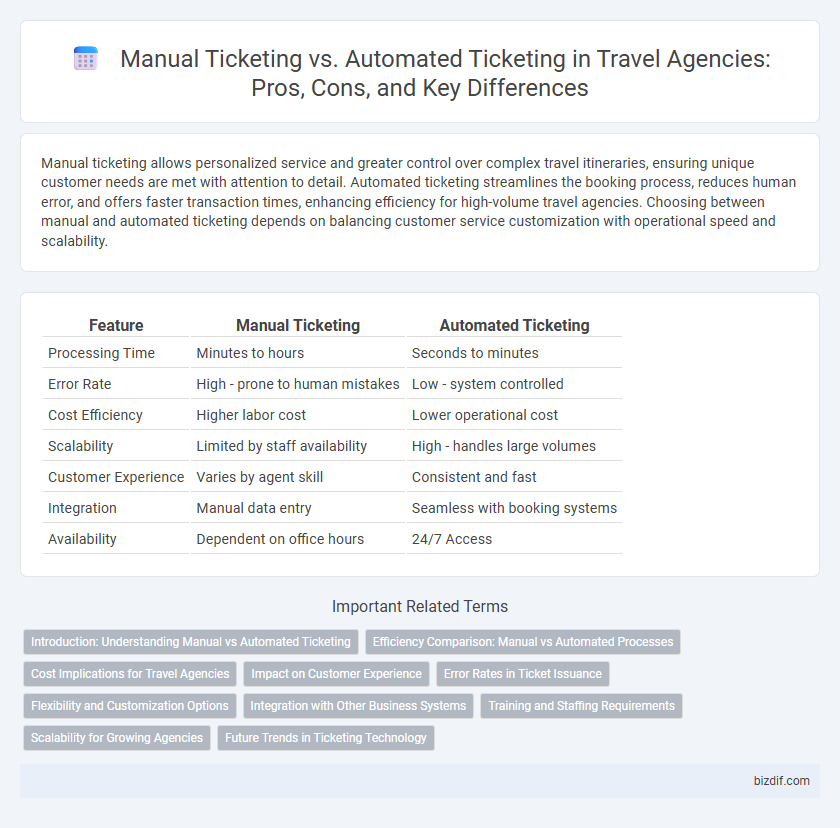Manual ticketing allows personalized service and greater control over complex travel itineraries, ensuring unique customer needs are met with attention to detail. Automated ticketing streamlines the booking process, reduces human error, and offers faster transaction times, enhancing efficiency for high-volume travel agencies. Choosing between manual and automated ticketing depends on balancing customer service customization with operational speed and scalability.
Table of Comparison
| Feature | Manual Ticketing | Automated Ticketing |
|---|---|---|
| Processing Time | Minutes to hours | Seconds to minutes |
| Error Rate | High - prone to human mistakes | Low - system controlled |
| Cost Efficiency | Higher labor cost | Lower operational cost |
| Scalability | Limited by staff availability | High - handles large volumes |
| Customer Experience | Varies by agent skill | Consistent and fast |
| Integration | Manual data entry | Seamless with booking systems |
| Availability | Dependent on office hours | 24/7 Access |
Introduction: Understanding Manual vs Automated Ticketing
Manual ticketing involves human agents processing bookings and issuing tickets, allowing personalized service and handling complex itineraries. Automated ticketing uses software systems to instantly generate tickets online, enhancing speed, accuracy, and availability for travelers. Travel agencies benefit from combining both methods to optimize efficiency and customer experience.
Efficiency Comparison: Manual vs Automated Processes
Automated ticketing significantly enhances efficiency by reducing processing time and minimizing human errors compared to manual ticketing systems. Manual processes often involve repetitive data entry and verification, leading to longer wait times and increased chances of discrepancies. Travel agencies adopting automated solutions experience faster transaction flow, improved accuracy, and the ability to handle higher booking volumes seamlessly.
Cost Implications for Travel Agencies
Manual ticketing involves higher labor costs due to the need for skilled staff to process bookings, while automated ticketing systems reduce expenses by streamlining workflows and minimizing human error. Automated platforms offer scalability that enhances efficiency, leading to significant cost savings on transaction handling and customer service. Travel agencies that invest in automation also benefit from lower operational overhead and improved profit margins.
Impact on Customer Experience
Manual ticketing often leads to longer wait times and increased human error, negatively impacting customer satisfaction. Automated ticketing systems provide faster processing, real-time updates, and enhanced accuracy, significantly improving the travel booking experience. Implementing automated solutions results in smoother transactions and higher customer retention for travel agencies.
Error Rates in Ticket Issuance
Manual ticketing processes in travel agencies exhibit higher error rates due to human input mistakes, delays in data entry, and inconsistencies in fare calculations. Automated ticketing systems leverage advanced algorithms and integration with airline databases, reducing errors significantly by ensuring accurate fare application and real-time validation. Studies show that automated ticketing can decrease issuance errors by up to 70%, improving overall customer satisfaction and operational efficiency.
Flexibility and Customization Options
Manual ticketing offers superior flexibility by allowing travel agents to tailor itineraries and make real-time adjustments based on client preferences, special requests, or unforeseen changes. Automated ticketing systems streamline the booking process with predefined options but often lack the depth of customization needed for complex or unique travel plans. Agencies leveraging manual ticketing can provide personalized travel experiences, adapting to diverse customer needs more effectively than automated systems.
Integration with Other Business Systems
Manual ticketing often faces challenges in seamless integration with other business systems, leading to delays and data inconsistencies. Automated ticketing leverages API connectivity to synchronize booking, payment, and customer management platforms efficiently. This integration enhances real-time updates, reduces errors, and improves overall operational workflow within the travel agency ecosystem.
Training and Staffing Requirements
Manual ticketing demands extensive training for staff to accurately process bookings and handle exceptions, leading to longer onboarding periods and increased labor costs. Automated ticketing systems streamline operations, reducing the need for specialized training by simplifying ticket issuance and minimizing human error. Investing in automated solutions allows travel agencies to optimize staffing levels and improve efficiency while maintaining high service quality.
Scalability for Growing Agencies
Manual ticketing limits scalability for growing travel agencies due to time-consuming processes and human errors, which can hinder booking volume and efficiency. Automated ticketing systems streamline operations by handling large transaction volumes quickly, reducing overhead costs, and enhancing customer satisfaction. Integrating automated solutions allows agencies to scale seamlessly and adapt to increasing demand in a competitive market.
Future Trends in Ticketing Technology
Future trends in ticketing technology emphasize automated systems powered by artificial intelligence and blockchain, enhancing security and efficiency in booking processes. Manual ticketing is gradually being replaced by digital platforms that offer real-time updates, personalized travel options, and seamless integration with mobile devices. Travel agencies adopting advanced automated ticketing solutions can expect increased customer satisfaction and streamlined operational workflows.
Manual ticketing vs Automated ticketing Infographic

 bizdif.com
bizdif.com